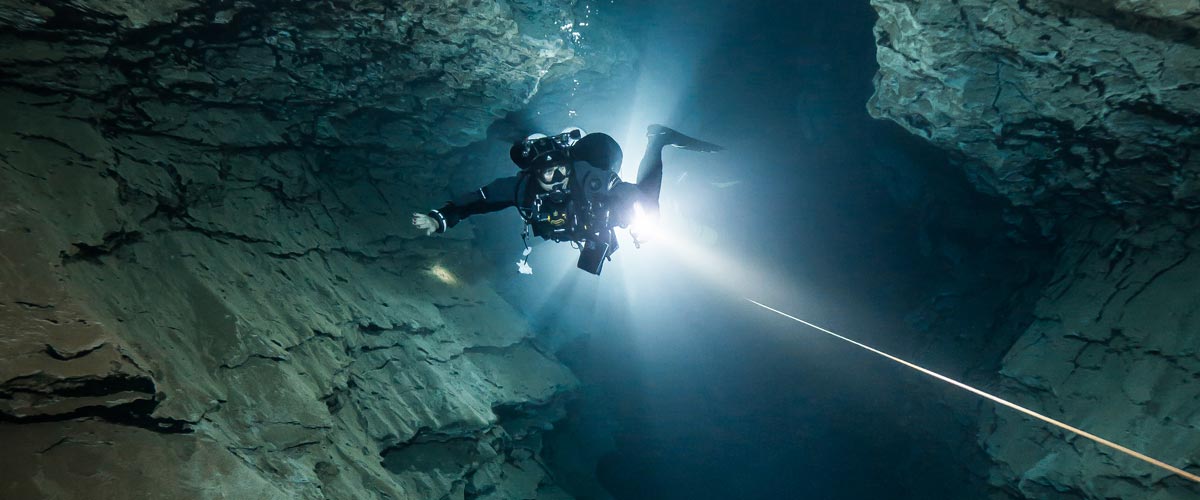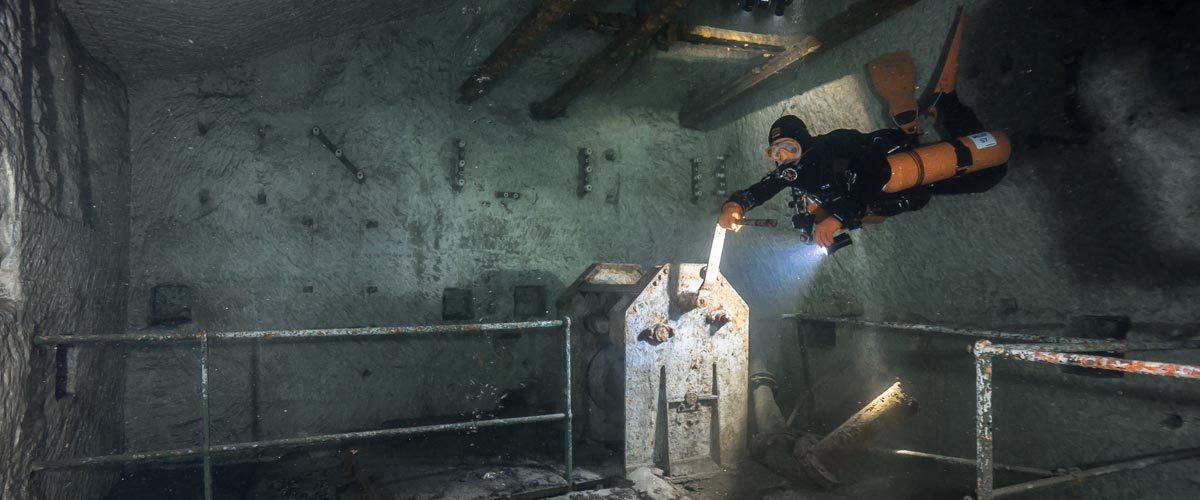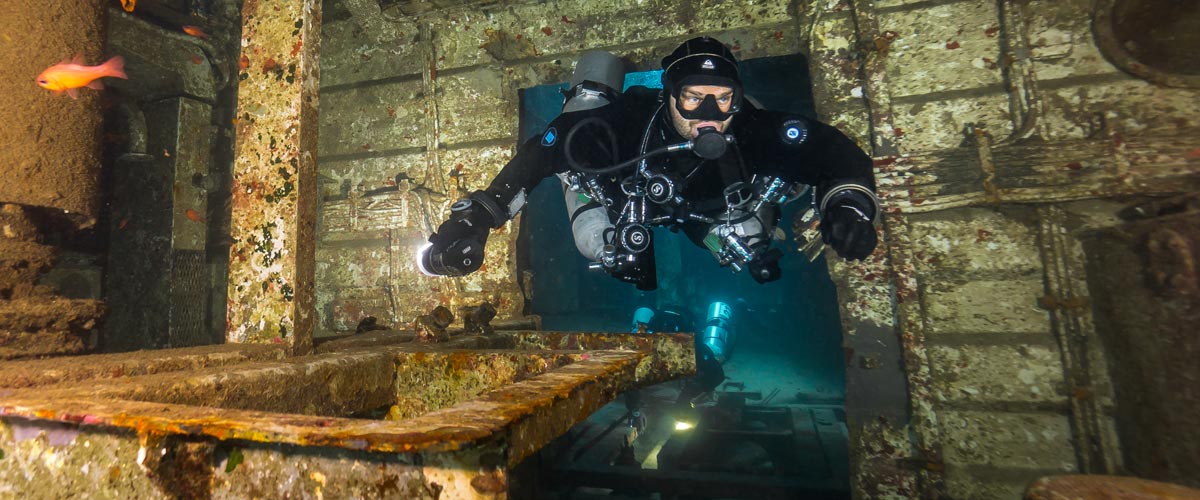Dive Training Blogs
Deptherapy returns to its Roots – Part 5
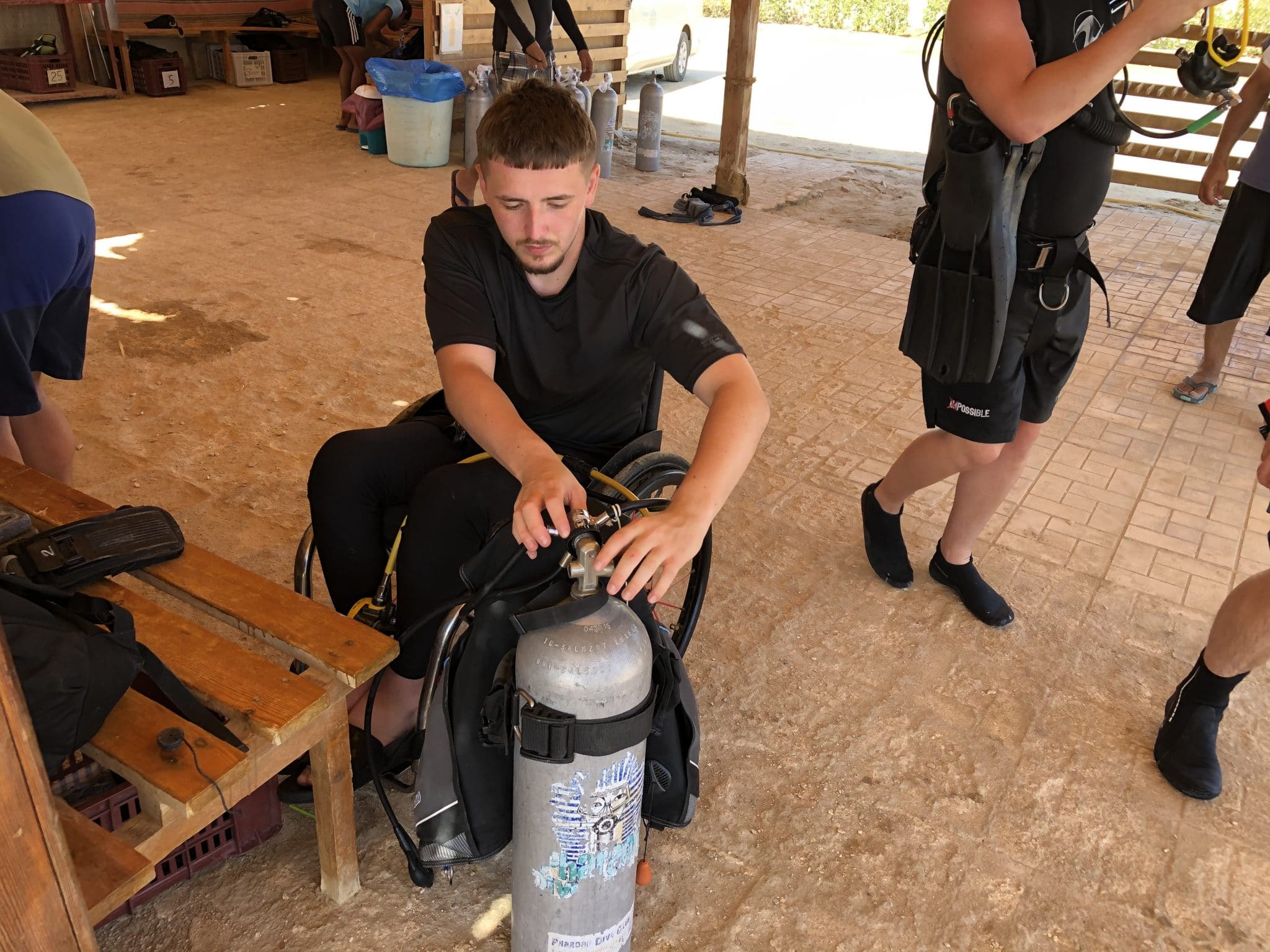
Join Richard Cullen from Deptherapy for part 5 of his Blog about the charity’s recent expedition to Roots Red Sea, El Quseir, Egypt.
After an evening of chilling out by the pool and in the bar, we are back to the Roots House Reef this morning, with Keiron continuing his RAID Master Rescue Diver Course and enjoying Moudi’s vast experience as he learns more about advanced buoyancy skills.
Not sure where the week has gone; it’s Wednesday already. A few different things happening today… Oatsie who has just started at Hull University on a Marine Biology Degree Course wants to complete his sidemount course and this afternoon he is out with Guy Henderson to start his learning. Swars also wants to do the course, as he wants to get into cavern and cave diving. Swars will start his course tomorrow afternoon and both will spend a day being taught be Steve Rattle on Friday. Hopefully they will both be certified as RAID Sidmount Divers at the end of their training.
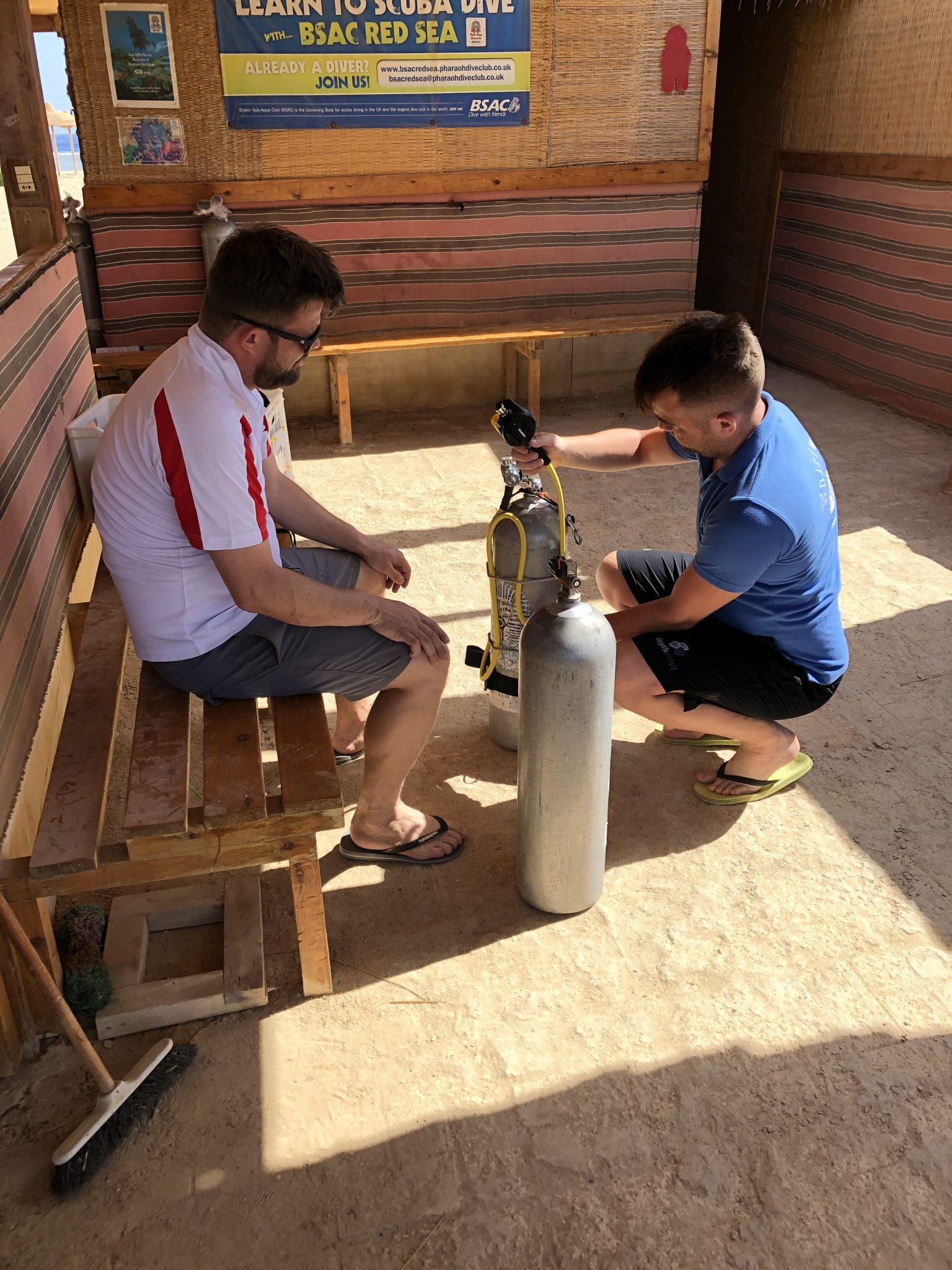
Tom putting his sidemount rig together under Guy’s watchful eye
The morning sees Swars and I working with Corey again and taking him through the remainder of skills and OW dives. He is improving massively but we still have to work on trim and propulsion.
Keiron, unfortunately for him, has Oatsie and Michael for his diver recovery exercises; I am told there may well be an entanglement to deal with!
Conditions are perfect again as we all look forward to three great dives during the day.
90% of those we work with have mental health issues, mainly Post Traumatic Stress Disorder as a result of serving in various theatres of war. If you read some adaptive teaching manuals, they have a task to ‘teach a student with PTSD a skill.’ Hmmmmm how is Oatsie, Swars, Michael or Keiron any different than a student who is free from any mental illness? The answer is they are not, they are exactly the same. Do you talk to them differently, do you demonstrate skills differently? The answer is no.
If they have a flashback or a panic attack, then you need to step back and provide whatever assistance is necessary but only if there is a risk of them hurting themselves. All our team have to undertake and pass the two-day Mental Health First Aid (MHFA) course so we can intervene appropriately where the circumstances require it.
Do you know what a panic attack looks like? Do you know how to respond to a panic attack?
Flashbacks most frequently occur at night time but some do experience day time flashbacks. Flashbacks can lead to the individual feeling physically and mentally drained and can be triggered by anything that reminds them of the traumatic incident(s) they experienced. Sometimes there might be a need for one of our medical team to be involved. Often a period of quietness, rest and possibly sleep is required.
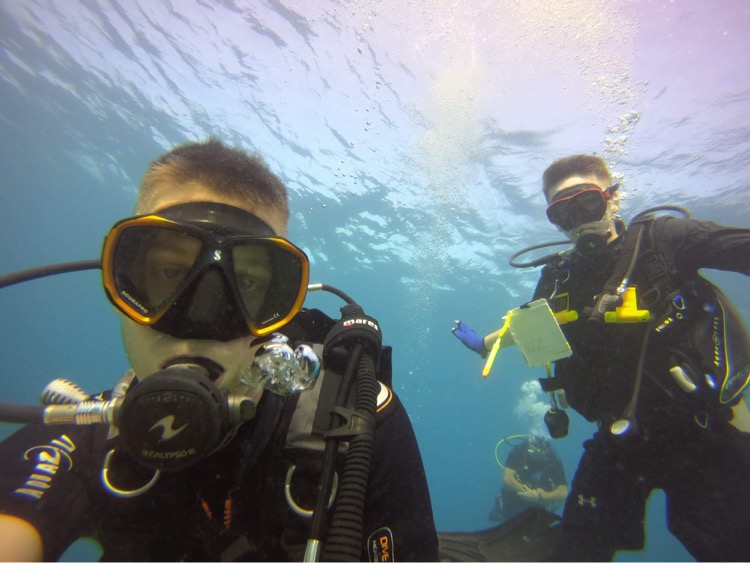
Keiron and Corey on the House Reef
We have seen lots of our beneficiaries learn to manage their PTSD. As Chris Middleton said on a BBC programme:
“You can’t beat PTSD but you can learn to manage it.”
In addition to the scuba diving, Deptherapy also provides 24/7 support for our beneficiaries. Beneficiaries are encouraged to attend the MHFA course with their partner, parent, relative or friend.
Many will have read comments from our beneficiaries, that once they put their heads under the water their demons disappear. There are several factors to this: the peace, the quiet and the tranquillity that occurs underwater, the beauty of the corals and the amazing aquatic life.
Roots is very much like a retreat for us, we are miles away from any towns, there are no distractions, the nearest town is El Quseir, which is orthodox Muslim so there is no alcohol on sale. The recent bypass of the main Safaga to El Quesir/Marsa Alam road means that at night time there is no noise, just a brilliant star lit sky.
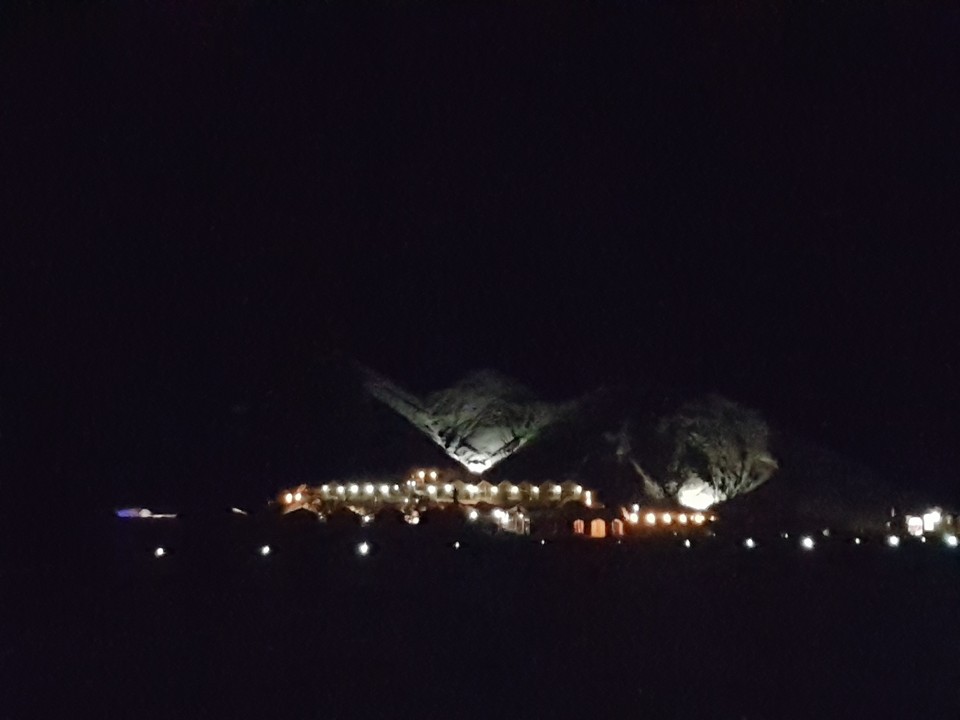
Roots at night from the beach
Beneficiaries are encouraged to talk openly with the team and their fellow beneficiaries about their injuries/illnesses and provide overwhelming support for each other as Corey found on this trip.
Our aim is to create a family atmosphere and Roots very much contributes to the sense of family and wellbeing.
Sadly, we live in a world where those with mental illnesses are largely discriminated against. Because few understand mental health, they are fearful of it and try to ignore it. Please look at the Mind website or even better sign up to a Mental Health First Aid Course. If you run a business then run the course for your staff, the benefits will be massive.
Back to the diving, Michael and Tom under Moudi’s close supervision gave Keiron some very challenging diver recovery exercises. Poor Keiron, but he responded tremendously.
Swars, is working well with Corey, ensuring horizontal trim and making sure he uses effective arm strokes for his swimming. We are organising an SMB session, so he can work with different types of SMBs.
Although we haven’t told him, he has finished all his skills but we still have work to do on his trim and propulsion. We want him to go beyond standards, we want him to be a very competent diver, who despite his devastating injuries, can self-rescue and support a buddy if in need.
The afternoon dive sees Michael joining myself and Swars with Corey. This dive is about buoyancy, trim and propulsion. Keiron is doing some more advanced buoyancy work with Moudi.
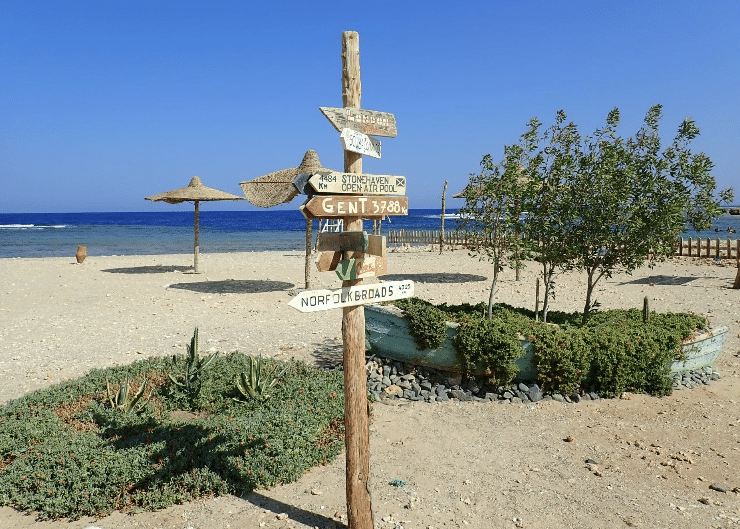
All roads lead to Roots, is this the future of Google maps?
Oatsie had a great dive with Guy using sidemounts and is looking forward to completing the sidemount course with Swars and Steve Rattle on Friday.
In the evening, and before dinner, Moudi runs the RAID O2 Administrator Course for all five beneficiaries. It is a qualifying part of Keiron’s RAID Master Rescue Diver course but we decided it would benefit all of the guys.
Tomorrow we have decided to take Corey to 30 metres and for him to complete a narcosis test. Join us back here tomorrow to find out how we get on…
Find out more about the work of Deptherapy and Deptherapy Education at www.deptherapy.co.uk
Blogs
Intro to Tech: What is it about?
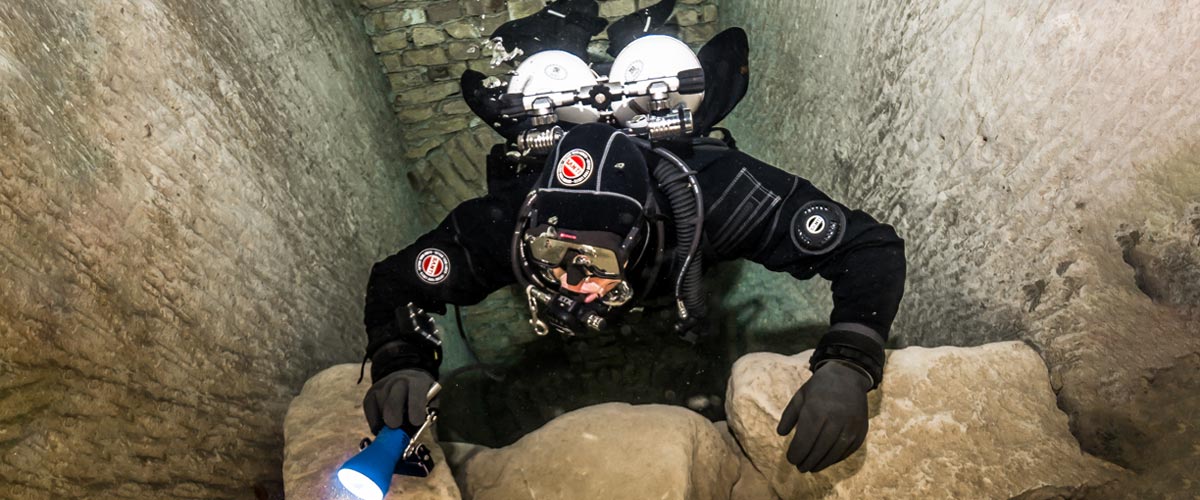
Article by José Pablo Mir
Pictures by Cezary Abramowski
The world of technical diving is exciting. It opens the door to new sites, depths, and bottom times. More importantly, it opens our minds to a new way of planning, facing, and experiencing dives, even those not purely technical.
Becoming a technical diver is a process, and like in other aspects of life, we should find the proper entry point that suits us best based on our knowledge and experience. The Introduction to Technical Diving course from TDI -the world’s largest and most recognized technical diving teaching organization- is the best option for divers who have yet to gain experience in the fundamental aspects of this new practice. The course’s content and its embrace of new techniques and technologies make it possible to acquire a solid foundation to learn and gain experience in this practice properly.
Becoming a technical diver is not something that happens overnight, whether deciding to become one or receiving a certification card stating we are now technical divers. It is a slow process extending farther away than any introductory course. It requires effort and dedication. But it will bring us satisfaction from day one -or two.
It is a matter of mentality
First, we must understand and accept that technical diving, involving greater depths, longer bottom times, exotic gases, virtual or real ceilings, and more, comes with higher levels of risk than the sport diving we have been practicing until now.
Although this discussion usually starts with a warning about risks, as I’ve done in the previous sentence, our practice is not a game of chance.
Technical diving is a rational activity that requires maturity and good judgment, and we will put everything into ensuring that each dive is a successful one -meaning we return from it safe and sound. With this understanding, we will strive to establish a mental attitude more aligned with our practice and its realities.
This new “technical diver” mindset we will develop will lead us to be more cautious in our executions, more analytical in our plans, more rational in our strategies, and more detailed in our procedures.
Experience will keep teaching us to know ourselves better, to keep our anxiety and other emotions under control, and to manage our impulses. Over time, our senses will sharpen, and we will be more attentive to the particulars of the situation we find ourselves in.
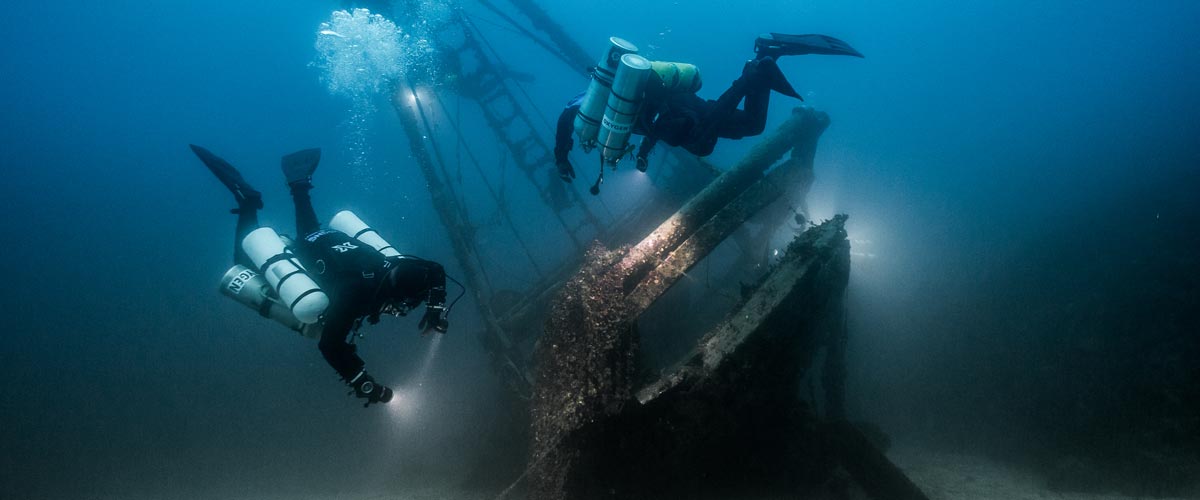
Strategies and procedures
Our strategies, those broad guiding lines tracing the path to follow, from how to approach planning to where, with what, and how we are willing to get there, will be more specific and more practical. Not because they magically become so, but because we will consciously and deliberately frame them that way.
We will establish clear, concise, and realistic procedures. Not only for the undesirable situations that may present themselves but also for those that are part of our dive objectives.
Even though, as technical divers, we often use equipment different from what we were previously accustomed to, it is essential to note that the gear does not make the diver. In a way, we could consider such equipment as the necessary tools to implement what our goal seeks to achieve, according to our strategies and procedures.
Technique plays an important role
We must put our greatest effort into learning and perfecting the different techniques we will be acquiring. Buoyancy, trim, propulsion, cylinder handling, deploying DSMBs and lift bags, valve drills, and more are essential skills we must begin to master to progress in our art. What we cannot do, when we need to do it, can harm us.
Our techniques must be effective and achieve the purpose for which they were devised. But they must also be efficient and require the least resources possible, including the time they take and the effort they demand. Effectiveness and efficiency will prevail over beauty and other considerations that may come to mind, although none of them should be mutually exclusive. A technique executed efficiently and effectively tends to have an inherent beauty.
Refining techniques is a lifelong mission. Some of them will be easy to master from the go; others, on the other hand, will be our life mission and will require many repetitions just to resemble the idea we have in mind of how they should be executed.
We must consider the environment
Our learning, the needs and musts of the practice we engage in, the experience we gradually gain, our strategies and procedures, and even our equipment and tools change with the environment.
Diving in the ocean, everything about us must be suitable for ocean dives. Conditions there rarely emulate those found in a pool, lake, or river. Variable winds and currents, greater depths, visibility conditions, other divers with uncertain skills around us, marine life, maritime traffic, distance from the coast, and many other factors add complexity and uncertainty.
It is never necessary to master the pool on the first day, but planning and aspiring to gradually cope with the ocean’s conditions is essential.
The cost of good training
We are aware that our resources are often scarce in relation to the possibilities of use we could give them if they were not. To a greater or lesser extent, we are part of the economic reality in which we are embedded.
Fortunately, the cost of good technical diver training is not an entry barrier. Comparing training and equipment costs, we see that the former are generally lower. Yes, lower cost for personalized service, essential to our future
performance and safety, than for a series of mass-produced products that are mere, albeit necessary, tools for an end.
The value of good training
The value of the training we received encompasses a range of characteristics, from emotional and methodological to technical and technological. TDI and its Introduction to Technical Diving course offer a deep and modern approach, with a teaching strategy that aims to create thinking divers, not merely obedient ones.
As technical divers, our knowledge is our primary tool. In this type of activity, what we don’t know can harm us.
Is this course optional?
Unfortunately, the fact that this Introduction to Technical Diving course is not a prerequisite for any subsequent training is an invitation to consider it optional. And we all know what usually happens to “optional” under budget constraints.
However, this course should be seen as optional only by those divers who are somehow familiar with the use of technical equipment, who have a mindset more in line with the requirements of this type of diving, who plan and execute the dives the proper “technical” way, who know their gas consumption rate, who are not intimidated by non-decompression tables, who feel comfortable using their dive computers, and know the techniques and have at least an acceptable level of buoyancy, positioning, and propulsion. Those can go straight to a more advanced training course, such as TDI’s Advanced Nitrox.
We must ask ourselves whether or not we are in that group.
Remember our goal: to have fun
Recreational diving is our passion. Jumping into the water carrying heavy equipment and having properly dotted our I’s and crossed our T’s have only one ultimate goal: fun. This is the activity we have chosen as a hobby. We must enjoy it; it must give us pleasure and make us vibrate.
Having a good time is not optional!
Blogs
Four opportunities to go pro in 2024 with Dive Friends Bonaire
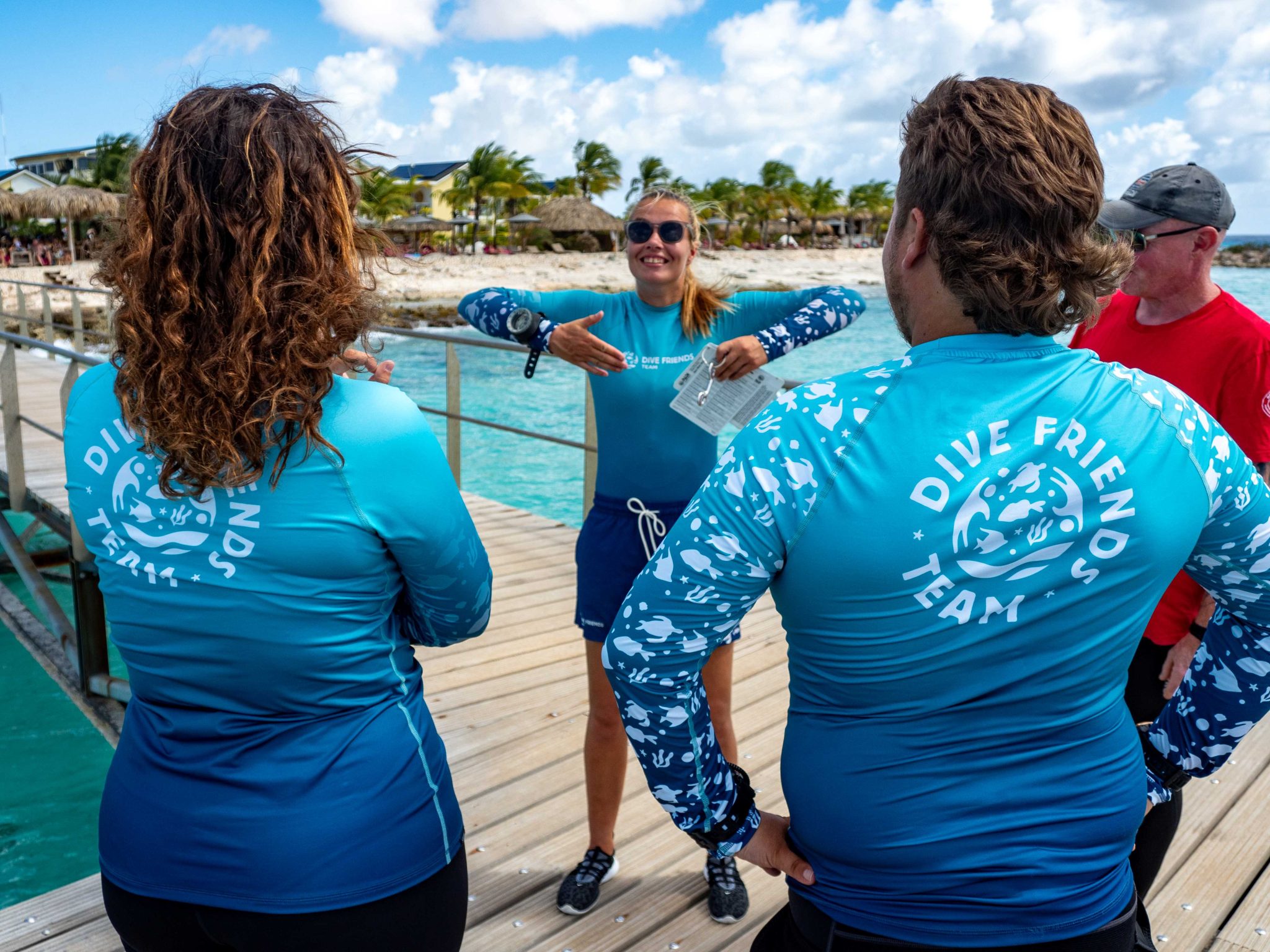
Dive Friends teaches the Instructor Development Course (IDC) several times a year to students who are eager to share their passion for diving with the world.
Dive Friends is known for the personal approach throughout the course. Their in-house course director will lead the students through every essential step, mentoring them to achieve their fullest potential as a dive instructor.
Applications for the following IDC start dates are now open:
- 12 April
- 5 July,
- 20 September
- 29 November
Partnership with Casita Palma
If the student opts for the IDC-Deluxe or IDC-Supreme package, their accommodation will be arranged for them at Casita Palma. This small and quiet resort is within walking distance from Dive Friends Bonaire’s main dive shop location and has everything you need to relax after an intense day of IDC training. Breakfast is included, so the student will always be fuelled and ready for their day.
Contact Dive Friends Bonaire’s Course Director Eddy for more information: coursedirector@divefriendsbonaire.com.
-

 News3 months ago
News3 months agoHone your underwater photography skills with Alphamarine Photography at Red Sea Diving Safari in March
-

 News3 months ago
News3 months agoCapturing Critters in Lembeh Underwater Photography Workshop 2024: Event Roundup
-

 Marine Life & Conservation Blogs2 months ago
Marine Life & Conservation Blogs2 months agoCreature Feature: Swell Sharks
-

 Blogs2 months ago
Blogs2 months agoMurex Resorts: Passport to Paradise!
-

 Blogs2 months ago
Blogs2 months agoDiver Discovering Whale Skeletons Beneath Ice Judged World’s Best Underwater Photograph
-

 Gear Reviews3 months ago
Gear Reviews3 months agoGear Review: Oceanic+ Dive Housing for iPhone
-

 Marine Life & Conservation2 months ago
Marine Life & Conservation2 months agoSave the Manatee Club launches brand new webcams at Silver Springs State Park, Florida
-

 News3 months ago
News3 months agoWorld’s Best Underwater Photographers Unveil Breathtaking Images at World Shootout 2023















